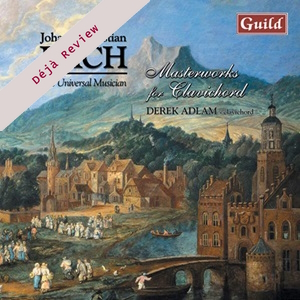
Déjà Review: this review was first published in November 2001 and the recording is still available.
Johann Sebastian Bach (1685-1750)
Masterworks for Clavichord
Derek Adlam (clavichord)
rec. 2001, Priory Church of Our Lady and St. Cuthbert, Worksop, UK
Guild GMCD7232 [77]
Derek Adlam is a keyboard player and instrument maker. On this recording, a selection of Bach’s keyboard works, he plays a clavichord he built himself, which is a copy of an 1763 instrument of by Johann Adolph Hass. Bach’s keyboard music has been recorded on many instruments and in many forms, yet it is only in recent years that clavichord recordings have become more common. Aside from Thurston Dart’s excellent recording of the French Suites, made in the 1960s, only a few recordings of Bach’s music on this instrument have been released. (One notable performer is Richard Troeger, who has embarked on a project to record all of Bach’s keyboard music that can be played on the clavichord. He has already released three recordings.)
The clavichord is an interesting instrument. To quote from the performer’s notes:
“What then is the advantage distinguishing the clavichord from the harpsichord? Despite the small sound, a clavichord player can achieve a considerable range of loud and soft tone. This effect was impossible to achieve on any other keyboard instrument by the fingers alone before the invention of the Florentine piano at the end of the 17th century. The clavichord player also is in contact with the string itself, so remains in control of the means of tone production. By varying the pressure, effects (including a vibrato) can be obtained which are achievable only on the clavichord. The instrument takes on some of the characteristic inflections and modulations of the human voice, an ideal instrumentalists have aimed at throughout the history of western music. Its intimacy of tone led to its association with personal expression and philosophical reflection. It became a spiritual confidant and comforter in times of distress.”
Bach’s music does indeed seem right at home on the clavichord. As this recording shows, the tone and colours of this instrument espouse Bach’s melodies and counterpoint perfectly. Adlam’s choice of works is very judicious. The opening Toccata in G major is an exuberant piece that allows the clavichordist to display the wide range of volume the instrument can express. (Although “wide” is a bit of a misnomer on an instrument with such a low overall volume.) The Suite in E minor for Lautenwerk (a keyboard instrument similar to a harpsichord, but strung with gut), a piece usually played on the lute, is a discovery – the sweet, subtle tones of the clavichord shed a new light on this beautiful suite. The masterful Prelude, Fugue and Allegro in E-flat major, also for Lautenwerk, is excellent, and the fugue shows just how ideal a clavichord is for playing such contrapuntal works. I wonder how the Art of Fugue would sound on a clavichord…
The only negative comment I have to make about his recording is that Derek Adlam often sounds a bit hurried. Perhaps the short duration of tones on the clavichord incites this, or maybe it is just his desire to fit all of these pieces on one disc. But this is a beautiful recording, and one that many Bach-lovers will appreciate. Furthermore, if you like Bach’s keyboard music but don’t like the sharper sound of the harpsichord, the muted tones of the clavichord might be just what you need to discover.
This fine recording of a selection of Bach’s keyboard works, played on clavichord, is masterfully played on a beautiful-sounding instrument. A definite must for Bach-lovers, and something to discover for those who have never heard the clavichord. I hope Adlam records more on this fine instrument.
Kirk McElhearn
Help us financially by purchasing from


Contents
Toccata in G major BWV 916
Capriccio sopra la lontananza de il fratro dilettissimo B-flat major BWV 992
Prelude, Fugue & Allegro in E-flat major for Lautenwerk BWV 998
Suite in E minor for Lautenwerk BWV 996
Fantasia & Fugue in A minor BWV 904
Prelude & Fughetta in E minor BWV 900
Prelude & Fugue in B minor on a theme by T. Albinoni BWV 923 & BWV 951
Prelude & Fughetta in G major BWV 902


















